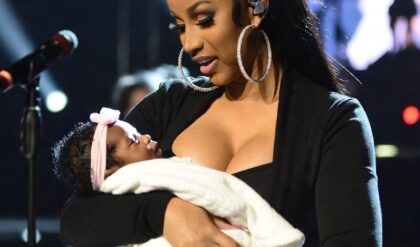
In this op-ed, writer Halima Jibril explores Camille’s pregnancy storyline in Emily in Paris season 4 part 1. Major spoilers ahead.
Season 3 of Emily in Paris ended in the hit show’s typical dramatic fashion. During their impromptu wedding ceremony in the French countryside, Camille broke off her engagement to Gabriel because, she reveals, Gabriel is actually in love with Emily. But, plot twist: Camille is expecting Gabriel’s baby.
This, of course, left us with many questions. What does Camille’s pregnancy mean for Emily and Gabriel’s relationship? Will Gabriel and Camille somehow find their way back to each other to raise the baby? And is this really the end for Emily and her boyfriend Alfie? But the biggest question is, of course, whether Camille will continue her pregnancy despite her impending marriage falling apart.
In fact, the ending made me and several people on Reddit wonder whether abortion may be an option. While there were several clues throughout season 3 that Gabriel seemed to want children (he watches children play at the park and helps a young girl with her makeshift boat), we’ve not seen those same hints for Camille. If Camille were a real person, she’d have a choice before her. But do those same options exist in the realm of the show? Does abortion exist in Emily in Paris?
The short answer is yes. The new season starts three days after Gabriel and Camille’s botched wedding, and we learn that Camille has not been seen since. Emily, determined to find her friend/rival, contacts Camille’s friends, who speculate that she has disappeared to have an abortion. To the show’s credit, Emily says the word “abortion” rather than using euphemisms, as we’ve seen in recent TV shows such as And Just Like That, the revival and sequel of Sex and the City. In that series, when Lisa Todd Wexley discovers she’s pregnant, she and her husband discuss the possibility of having an abortion, but rather than using the word, her husband asks, “Should we be having the other discussion?”
It’s easy — and tempting — for TV shows to act like abortion doesn’t exist. As a highly politicized form of health care, abortion is often viewed as controversial, something that showrunners may want to avoid so they don’t alienate any specific audience. This is why shows like And Just Like That, Grey’s Anatomy, and Girls all have unwanted pregnancy storylines that end in spontaneous miscarriages rather than abortion. This recurring trope, which writer Tanya Melendez described as the “Whew! That was close!” plot, takes the choice to have or not have an abortion out of the character’s hands, thus sparing the writers and showrunners from any backlash their choices might have caused.
While Emily in Paris does not shy away from the word “abortion,” it does avoid the procedure itself. When Emily finds Camille in Giverny, the French commune famously once home to Claude Monet, she asks Camille what she plans to do. Camille romantically responds, “None of it is perfect, but all of it is beautiful.” While we don’t see it, the show implies that Camille has spent time away contemplating what comes next. She apparently was not thrilled about the pregnancy at first but ultimately became excited about having a child with a man she deeply cares for.
But part 1 of Season 4 ends with Camille discovering that she was never pregnant — her pregnancy test gave a false positive result. In true “Whew! That was close!” fashion, Camille’s pregnancy doesn’t just end, it never even was. The show did put abortion on the table as an option — a step more than many shows are willing to take — but rather than explore the complexities that come with considering your reproductive future, Emily in Paris opted for a strange, even fantastical, ending. False positive pregnancy tests are extremely rare, occurring less than 1% of the time. Of course, little about the show is realistic, but portrayals of pregnancy, abortion, and reproductive decisions at large on television have long been flawed, making accurate portrayal all the more important.
According to the yearly report conducted by Advancing New Standards in Reproductive Health, there were 49 abortions on television in 2023, up from just 13 in 2016 when ANSIRH began its research project. In recent years, we’ve seen some excellent abortion narratives from shows like Sex Education, Shrill, GLOW, and The Bold Type, which have all attempted to portray accurate abortion storylines; however, these narratives still have their flaws. These storylines tend to rely heavily on the notion of “choice” and empowerment, which, as academic Sarah Banet-Weiser has argued, “individualizes abortion as a personal choice, abstracting it from being a political, structural issue.”
But beyond the relatively accurate portrayals, TV has a history of using pregnancy storylines to punish women for acting outside of “acceptable” gender norms, with abortion rarely presented as a genuinely viable option. This is evident in shows like Gilmore Girls, where Lane, who frequently rebels against her strict Christian mother, becomes pregnant after her first sexual encounter. Abortion is never discussed in that show.
Camille’s pregnancy storyline parallels that of Brenda Feigen in the historical drama Mrs. America, which portrays the fight to ratify the Equal Rights Amendment (ERA). Feigen, a feminist, activist, and attorney, becomes pregnant by her husband while having an affair with a woman named Jules. Although her husband is open to a more unconventional lifestyle, the episode ends with Brenda seeming trapped by heterosexuality as she sits with her husband and their couple friends. Brenda ends her relationship with Jules upon discovering her pregnancy, just as Camille’s relationship with Sofia ends due to Camille’s pregnancy and connection to Gabriel. In each case, pregnancy serves to rein in these women, curbing their rebellion against traditional gender roles.
Whether or not a character ultimately chooses abortion isn’t fully the point. When shows like Emily in Paris shy away from full discussions of it — no matter the outcome — they’re cutting the audience off from the full range of choices that exist. Deciding what to do after learning about an unexpected pregnancy is simple for some and unendingly complicated for others. But consistently skipping over that complexity does us all a disservice — even in a lighthearted show like Emily in Paris.
While Emily in Paris acknowledges the existence of abortion, it ultimately sidesteps the procedure by resolving Camille’s pregnancy with a rare false positive test result. This approach reflects a broader trend in television where pregnancy is used as a narrative device to reinforce traditional gender roles without fully engaging with the realities of reproductive choices. In Emily in Paris, it can be argued that abortion is mentioned as an act of virtue-signaling, as feminist academic Cordelia Freeman has noted, to show viewers and investors that they support women’s right to make choices about their bodies. However, these portrayals don’t go far enough in combating inaccurate myths about abortion or in actually showcasing the procedure. So even though abortion does exist in Emily in Paris, it also doesn’t — not really.








